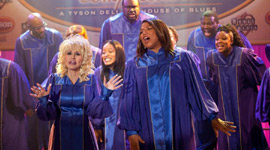Was Dolly Parton Really Miming At Glastonbury?
By George Percival in Music / Festivals on 07 July 2014
There have been miming accusations levelled at Dolly Parton’s crowd-pleasing Glastonbury set, we look at the evidence.
It’s nothing new for a universally acclaimed artist to mime in front of huge crowds. Eminem mimed his way through his 2013 Reading Festival headline appearance and still received a mostly positive reaction from a boisterous crowd. But for most live music enthusiasts, an artist miming in a live setting is nothing short of a heinous crime, an unforgivable cardinal sin that betrays the entire point and of live performance and leaves the artist devoid of integrity. Perhaps that best explains the furore that greeted Dolly Parton’s Glastonbury set as many people asked the question- “was Dolly miming?”

'Mimegate' sparked a huge debate over whether the singer was actually singing during her set.
In response to a wave of criticism and accusations from commentators, Parton replied to enquiries to the Sun: “My boobs are fake, my hair is fake but what’s real is my voice and my heart”. Parton continues to deny any falsehood in her otherwise hugely entertaining performance, which managed to draw a crowd that dwarfed that of the headlines Arcade Fire, Metallica and Kasabian whilst besting every other main stage act in terms of audience size. Over 100,000 flocked to see the country star, now 68, deliver such iconic tracks as “Jolene” and “Blue Smoke” but it seemed for some the fact that she wasn’t actually singing was all too evident. Television viewers were also quick to point out discrepancies between Parton’s lips and the vocals that were audible. Fans who watched the show from the comfort of their living rooms rather than the festivals muddy confines have suggested that the blame for the controversy lies not with the fact that Parton was duping fans but a delay in the TV signal which made it appear as if Parton’s vocal trailed her physical movements by several milliseconds.
More: Dolly Parton Receives Award For Selling 100 Million Albums During Glasto Set
Well-spoken celebrity egghead Stephen Fry was amongst those who leapt to the defence of the rhinestone-encrusted Parton, declaring to his copious Twitter followers that the issue lay with the broadcasters rather than Parton herself. Regardless, it is a known fact that Parton has previously used pre-recorded elements in her shows as “an effort to entertain by being able to have a bigger production and, hopefully, a better sound”, according to a 2004 statement found on her website, Dollymania. But the light-hearted way in which Dolly Parton has brushed away such accusations by a typically ravenous British press suggests that the claims themselves are a load of codswallop. With no comment from the event’s organisers on the issue, it looks as though all we can do is speculate but her legendary status affords the multi-million selling artist the benefit of the doubt.
More: 10 Facts About Glastonbury Performer Dolly Parton
Moreover, the levels of criticism directed towards the country music legend seem hugely skewed considering the widespread use of vocal pitch correcting software known widely as auto-tune which is employed by a staggering amount of artists both on record and in live performance, most famously on the talent-hunting TV show X-Factor. Doctored vocals are an unfortunately ubiquitous facet of live performance from today’s pop stars who largely escape such sharp-clawed criticism as that aimed at the Dolly.
Contactmusic
Movies and Trailers

Joyful Noise Movie Review
Life-affirming to the point of distraction, this comedy is so warm and cosy that it...

Joyful Noise Trailer
In the small Georgian town of Pacashau, Divinity Church Choir singer Vi Rose Hill (Queen...

Gnomeo & Juliet Trailer
Some gardens just wouldn't be complete without the addition of a garden gnome or two....














